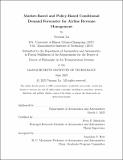Market-Based and Policy-Based Conditional Demand Forecaster for Airline Revenue Management
Author(s)
Lu, Yuxuan
DownloadThesis PDF (2.951Mb)
Advisor
Belobaba, Peter P.
Terms of use
Metadata
Show full item recordAbstract
The price transparency brought by the proliferation of online travel agencies and the loosening of fare class restrictions increases the importance of competitive pricing in the practice of airline revenue management. In this dissertation, we propose a novel forecasting framework, market-based and policy-based conditional demand forecaster (MPCF) to provide airline revenue management systems (RMSs) with dynamically adjusted sell-up probabilities and fare class demand forecasts based on estimated total market demand (market-based) and predicted fare class availabilities of competitors (policy-based) for a future flight departure.
In the MPCF framework, an airline estimates the total market demand for travel on a future departure day and predicts its competing airline’s future fare class availabilities. The estimation of the total market demand allows the forecasting airline to anticipate additional demand when it offers lower fare quotes than its competitors and vice versa; the prediction of a competitor’s policy enables the revision of expected passenger sell-up probabilities to higher fares, conditioned on competitive influences and assumed passenger choice behaviors.
In simulation tests, we assumed a Bertrand-Edgeworth passenger choice model, corresponding to a fully undifferentiated fare environment. With an assumption of perfect knowledge of total market demand that has already arrived for a future departure date, MPCF gains 12.69% in revenue compared with the existing Q-forecasting in an isolated market. Without that perfect knowledge, which requires estimation of total market demand, MPCF still gained 6.23% of revenue. MPCF leads to higher revenue gains on departures with demand levels that are different from the mean historical demand, demonstrating its benefits in providing dynamic sell-up and forecast guidance according to the predicted policies of competitors. The simulation results confirm the benefits of constructing demand forecasts on predicted market demand and competitors’ policies.
Date issued
2023-06Department
Massachusetts Institute of Technology. Department of Aeronautics and AstronauticsPublisher
Massachusetts Institute of Technology